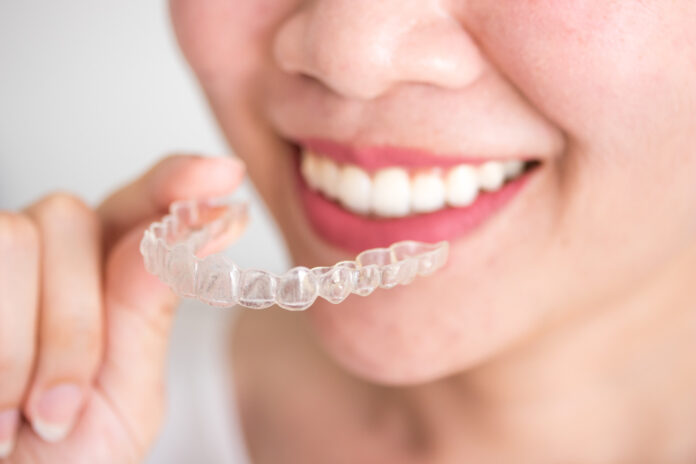Invisalign is a popular orthodontic treatment used as an alternative to braces. Invisalign is a great way to straighten your teeth. Unlike the visible metal brackets and wires used in braces, Invisalign is made of almost invisible clear plastic.
It helps prevent anyone from knowing that you are undergoing dental treatment. In addition, you skip the pain and food restrictions that accompany the use of braces. However, it is vital to note that these plastic aligners are not without side effects.
A common problem associated with the use of Invisalign is dry mouth. Also known as xerostomia, dryness in the mouth can be uncomfortable. It can further make it difficult to swallow or speak and cause bad breath.
Therefore, when using Invisalign, it is best to take steps to prevent or combat dryness of the mouth, for which you can take the advice of your dentist.
How Invisalign Causes Dry Mouth?
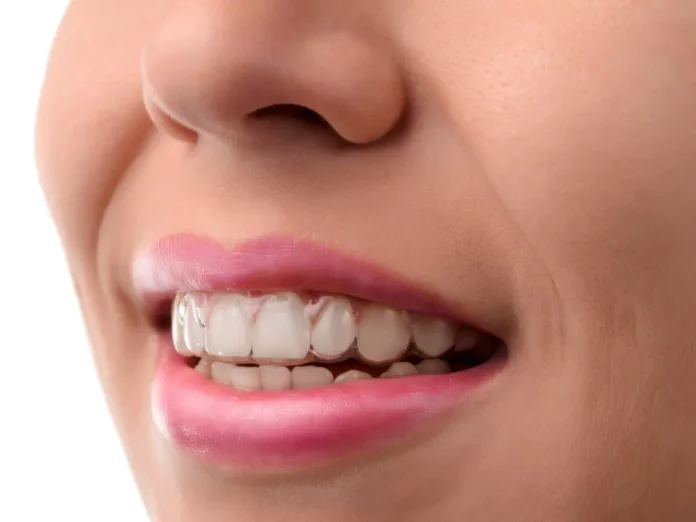
Dry mouth or xerostomia is caused by a lack of saliva production. This can occur due to several factors, such as stress or sleeping with an open mouth. However, if you are using Invisalign, you are likely to suffer from xerostomia because of the same.
When you use aligners for the first time, the body’s defense system perceives the medical-grade plastic as a foreign object. As a result, the body creates an inflammatory response in the gums, leading to discomfort.
In addition, the body lowers the production of saliva, leading to dryness. This will make you feel parched more often and also cause dehydration. In addition, changing oral habits and food intake because of the treatment can also contribute to a dry mouth.
Also, you may breathe from your mouth initially after the treatment, leading to further dryness and bad breath. However, several things can help you combat this dryness easily. You may contact your dentist for advice on the same.
Tips To Get Rid Of Invisalign Dry Mouth
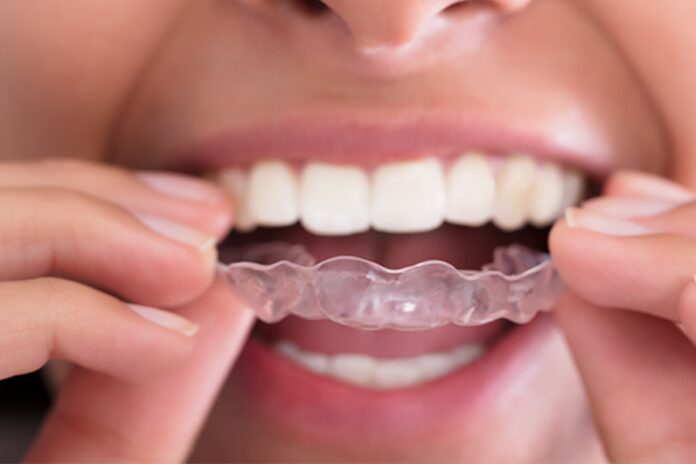
A few simple steps and daily habits can help combat the problem of xerostomia that occurs due to the use of Invisalign. These include:
1. Stay Hydrated
The most vital step to improving your dry mouth is constant hydration. You should consume plenty of water to help improve the production of saliva by your salivary glands.
It is recommended to drink 10-12 glasses of water per day when having xerostomia due to orthodontic treatment. Regular water intake also helps wash out the bacteria or food particles that can cause a foul odor if stuck on your teeth or aligners for a long time.
However, make sure to reach the maximum of your fluid intake with water itself, since alcoholic or sugary drinks can contribute to dryness and are even harmful to the aligners.
Always keep a bottle of water by your side. You can also suck ice every once in a while, as it will also help relieve the pain of a new treatment.
2. Keep Your Invisalign Clean
It is vital to clean your aligners if you want to circumvent the problem of a dry mouth or bad breath. Any food particles or bacteria stuck to your aligners can irritate your gums, leading to a decrease in saliva production.
Moreover, unclean aligners can cause an increase in bacteria production, causing a bad odor. Therefore, make sure to rinse your aligners every time you remove them or as per the instructions of your dentist.
Along with the Invisalign, also wash its case. You should also maintain oral hygiene by brushing twice daily and flossing regularly to prevent transferring bacteria or food to the aligners.
3. Use A Mouthwash, Spray, Or Mint
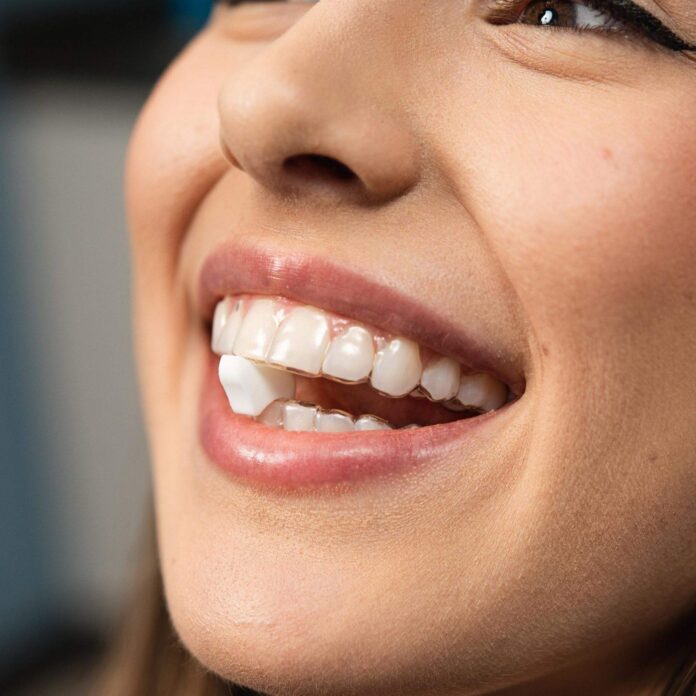
You can find sprays and mouthwashes that can help combat the problem of a dry mouth. Ask your local pharmacy for an over-the-counter antibacterial or antimicrobial wash containing fluoride and add it to your dental hygiene routine.
Additionally, you can also try using sugar free-mints if you have a problem with bad breath caused by dryness. Movemints have been created especially for Invisalign users to help prevent dryness.
You can also use sugar-free moisturizing sprays to help treat a dry mouth.
4. Use A Humidifier
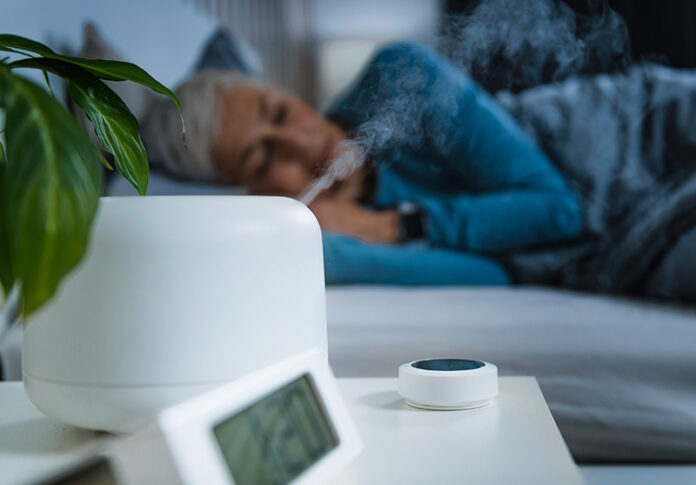
A humidifier is a handy device for treating dryness in any part of the body, including the mouth. It works by increasing the moisture level in the air.
This is especially useful if you face a problem with a dry mouth after waking up. You may breathe from your mouth while sleeping. In such a case, running a humidifier in your room overnight will help subdue dryness and stimulate the production of saliva.
5. Modify Your Diet
Your diet plays an important role in your overall health. The type of food you consume can alter the environment of your mouth, stimulating or lessening saliva production.
Dry foods, such as bread, or high in salt content, such as chips, can contribute to xerostomia. In addition, drinks such as soda, coffee, and alcohol can cause dehydration, leading to a dry mouth. Thus, it is best to avoid such foods and drinks.
On the other hand, foods with a high moisture content can help prevent dryness. These include fresh fruits, fruit smoothies, soups, eggs, fish, and vegetables such as carrots and broccoli.
Therefore, it is recommended to include foods with high moisture content in your diet. In addition, drink lukewarm water with your meal to help retain moisture in the mouth.
You also need to avoid smoking or consumption of tobacco as it can worsen your problem of xerostomia.
Conclusion
While dry mouth may not seem to be a big concern, you should remember that the level of saliva production can play a big role in the health and immunity of your mouth, which ultimately affects your internal body. A prolonged case of xerostomia can affect your food intake. Moreover, dryness in the mouth allows bacteria to stick to the teeth, leading to foul breath, cavities, and gum disease.
Therefore, if you are using Invisalign, make sure to follow good hygiene practices and increase your water intake to avoid dryness and discomfort. Consult your dentist for the best practices.
